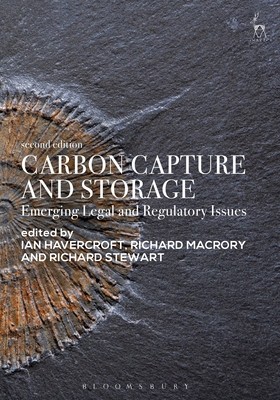
- We will send in 10–14 business days.
- Publisher: Hart Publishing
- ISBN-10: 1509909583
- ISBN-13: 9781509909582
- Format: 17 x 24.6 x 3.3 cm, kieti viršeliai
- Language: English
- SAVE -10% with code: EXTRA
Carbon Capture and Storage (e-book) (used book) | bookbook.eu
Reviews
Description
Carbon Capture and Storage (CCS) is increasingly viewed as one of the most significant ways of dealing with greenhouse gas emissions. Critical to realising its potential will be the design of effective legal regimes at national and international level that can handle the challenges raised but without stifling a new technology of potential great public benefit. These include: long-term liability for storage; regulation of transport; the treatment of stored carbon under emissions trading regimes; issues of property ownership; and, increasingly, the sensitivities of handling the public engagement and perception.
Following its publication in 2011, Carbon Capture and Storage quickly became required reading for all those interested in, or engaged by, the need to implement regulatory approaches to CCS. The intervening years have seen significant developments globally. Earlier legislative models are now in force, providing important lessons for future legal design. Despite these developments, the growth of the technology has been slower in some jurisdictions than others. This timely new edition will update and critically assess these updates and provide context for the development of CCS in 2018 and beyond.EXTRA 10 % discount with code: EXTRA
The promotion ends in 21d.13:15:29
The discount code is valid when purchasing from 10 €. Discounts do not stack.
- Publisher: Hart Publishing
- ISBN-10: 1509909583
- ISBN-13: 9781509909582
- Format: 17 x 24.6 x 3.3 cm, kieti viršeliai
- Language: English English
Carbon Capture and Storage (CCS) is increasingly viewed as one of the most significant ways of dealing with greenhouse gas emissions. Critical to realising its potential will be the design of effective legal regimes at national and international level that can handle the challenges raised but without stifling a new technology of potential great public benefit. These include: long-term liability for storage; regulation of transport; the treatment of stored carbon under emissions trading regimes; issues of property ownership; and, increasingly, the sensitivities of handling the public engagement and perception.
Following its publication in 2011, Carbon Capture and Storage quickly became required reading for all those interested in, or engaged by, the need to implement regulatory approaches to CCS. The intervening years have seen significant developments globally. Earlier legislative models are now in force, providing important lessons for future legal design. Despite these developments, the growth of the technology has been slower in some jurisdictions than others. This timely new edition will update and critically assess these updates and provide context for the development of CCS in 2018 and beyond.

Reviews